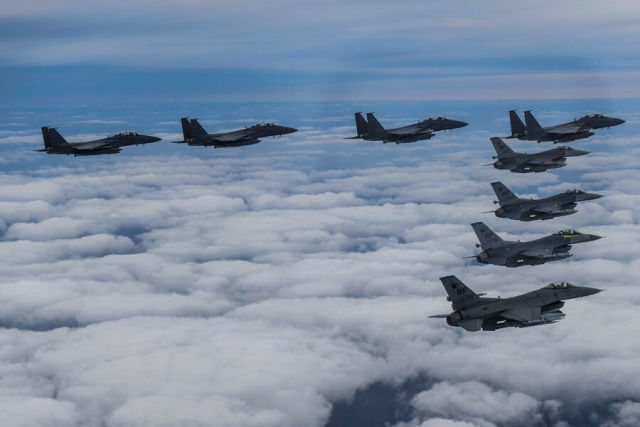Yonhap: South Korea took fighter jets into the air, revealing 180 military aircraft of the DPRK Any attempt by the DPRK to activate nuclear weapons against the United States or its allies will lead to the end of Kim Jong-un's rule, the Pentagon said in response to the aggravation of the situation on the Korean peninsula.
Today, on November 4, North Korea, as reported in Seoul, "set in motion" more than 100 fighters. Details of the situation are in the material of "Gazeta.Ru".
South Korea has detected the "setting in motion" of more than 180 North Korean military aircraft and has lifted its approximately 80 stealth fighters into the air, Yonhap news agency reports.
One of South Korea's main allies, the United States, has already stated that any attempt by the DPRK to attack the United States or its ally with nuclear weapons, including non-strategic nuclear control, will lead to the end of the regime of leader Kim Jong Un. This was stated by the head of the Pentagon, Lloyd Austin.
Earlier, Austin also expressed concerns that North Korea's attempts to create nuclear and ballistic missiles threaten the entire world and pose "a growing serious threat to security and stability in the region and the world."
The Pentagon chief stressed that Washington is ready to supply Seoul with "a full list of US defense capabilities, including nuclear, conventional and missile, as well as advanced anti-nuclear capabilities."
The United States will not permanently deploy new strategic weapons on the territory of the Korean peninsula. Nevertheless, the Pentagon will continue to rotate the weapons already there.
"At present, we have no plans to make changes to our permanent positioning or deployment of weapons on the peninsula," the United States Secretary of Defense stressed.
Exercises of the USA and South Korea
Since October 31, joint exercises of the US and South Korean Air Forces called Vigilant Storm have been taking place. They were supposed to end on November 4, but on November 2, the DPRK launched 23 different types of missiles towards the Yellow and Japanese Seas. One of them, according to Seoul, fell in the south of the demarcation line with the DPRK (NLL) near the territorial waters of South Korea. In addition, North Korea fired artillery 100 times in the buffer zone near the border with South Korea in the Sea of Japan.
They fell at the same distance from the boundary line as North Korea's missiles, but north of the NLL
"This accurate shooting by our military shows South Korea's readiness to respond decisively to any provocation, including launches of short-range ballistic missiles, as well as the ability and readiness to deliver an accurate blow to the enemy," the Joint Chiefs of Staff stressed.
Due to the aggravation of the situation, the United States and South Korea decided to extend the exercises indefinitely.
The parties have previously stated that the alliance "remains solid as a rock." Representatives of the American and South Korean sides called on the DPRK to "turn away from its destructive path."
After the announcement of the continuation of military exercises, North Korea fired two more short-range ballistic missiles and one intercontinental ballistic missile, presumably the Hwasong-17. This is the 30th day in a year that Pyongyang has tested its missiles.
"We know that North Korea expresses indignation at the military exercises of the United States and South Korea. The Japanese government believes that North Korea can go to other provocations, including conducting nuclear weapons tests," RIA Novosti reports the words of the Secretary General of the Japanese Cabinet of Ministers Hirokazu Matsuno.
He said that the authorities of the country will monitor the situation and take measures to protect their citizens.
Russia believes that it is time for countries to analyze the offer of Moscow and Beijing to help resolve the conflict on the Korean peninsula. Russian Deputy Foreign Minister Andrei Rudenko said that issues "related to the Korean nuclear program" should be resolved with the participation of all UN Security Council countries and those involved in it - the Russian Federation and China.
"We have our own proposals for this participation, we believe that it is time to approach them as seriously as possible," the diplomat said.
Washington hopes that Moscow and Beijing will be able to convince Pyongyang not to resume nuclear tests, Reuters writes, citing a senior White House official.
"China and Russia have long opposed the DPRK's nuclear program. Therefore, we believe and, of course, expect that they will use their influence to force the DPRK not to conduct nuclear tests," the source said.
He added that the United States has a "high degree of confidence" that the DPRK has already carried out preparatory work for this.
Angelina Milchenko

